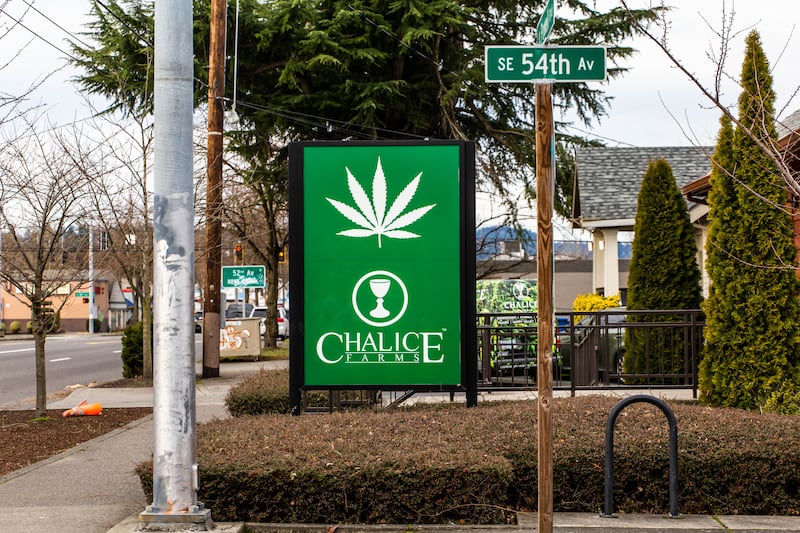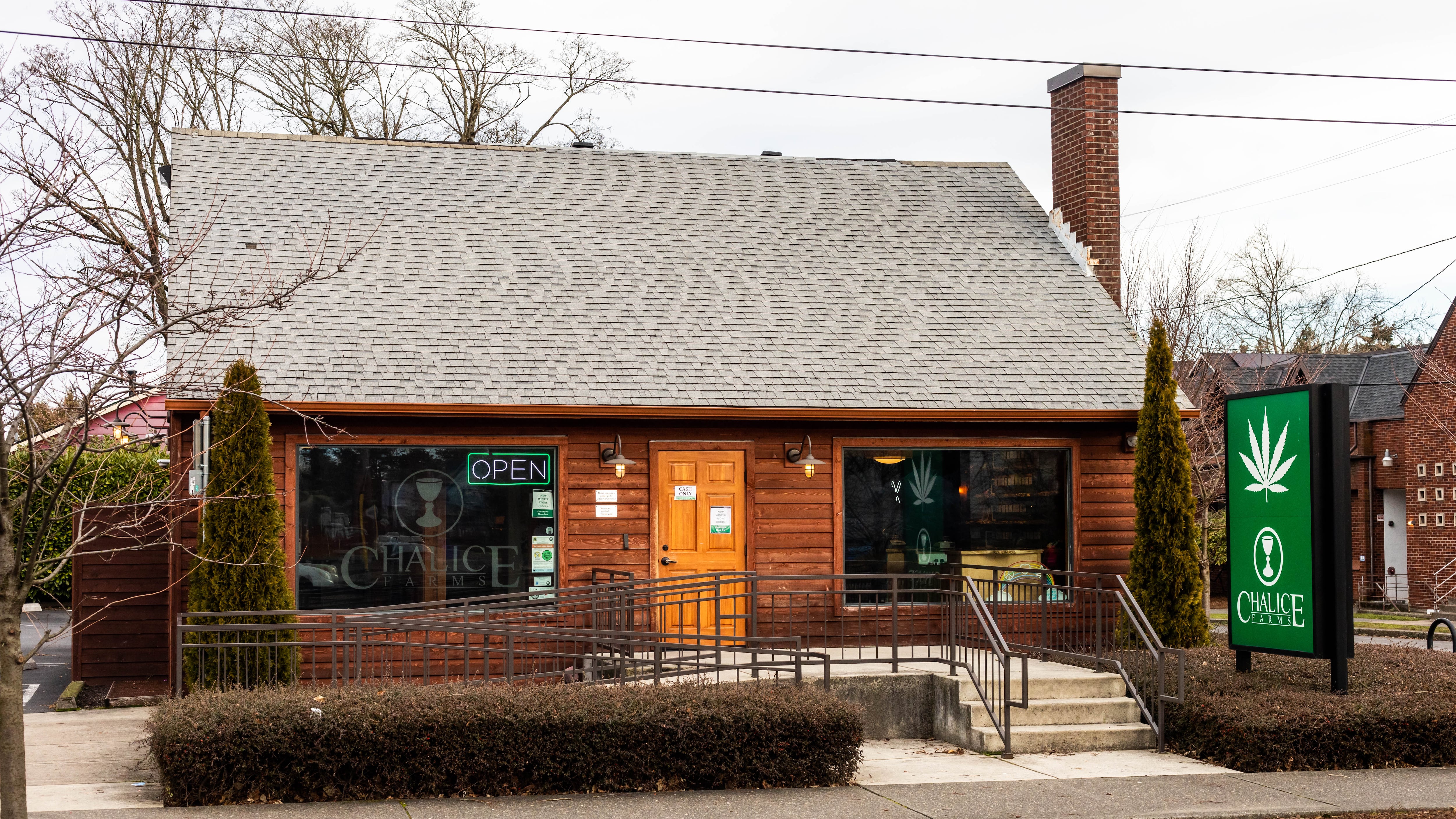In the latest sign of an ailing industry, one of the biggest buyers of Oregon cannabis—the publicly traded Canadian company Chalice Brands—is facing charges that it failed to pay some Oregon farmers and product makers for flower, pre-rolls, edibles and other weed products it placed in its Oregon dispensaries.
Four Oregon farmers tell WW that Chalice owes them thousands of dollars for cannabis products the company purchased within the past year but have not yet paid for.
According to the growers and invoices shared with WW, the unpaid bills add up to more than a hundred thousand dollars.
For some farms, the unpaid invoices mean employee layoffs in a market where profit margins are slim and capital reserves are rare.
“Chalice is financing its business on the backs of small farmers,” says Marianne Cursetjee, owner of Alibi Cannabis in Clackamas County. “People are too afraid of saying things out loud because we have no power to collect anything outstanding. I really, truly feel that Chalice is a house of cards.”
Invoices shared with WW show that Chalice owes her farm $5,350 for buds and pre-rolls it bought in July.
In a statement, Chalice executive board liaison Faviola Bishop said Chalice is “completely committed to getting all of our partners paid what they are owed and feel their pain.”
Bishop added: “Taking aim at anyone in the industry today doesn’t help small farmers, it can potentially hurt them.”
To those who study the industry, like economist Beau Whitney, Chalice’s unpaid invoices show the power dynamics between big companies with outside capital, which retail recreational cannabis, and homegrown businesses that actually grow the weed and exist paycheck to paycheck.
“If you lose money during a quarter but have $100 million in the bank, it’s easier to bridge yourself versus a small individual firm that doesn’t get paid for a few months and struggles to make payroll,” Whitney says. “It’s just a general indicator of how much the industry is struggling right now.”

Chalice Brands began as Oregon-based Chalice Farms.
In 2014, a young, affable West Linn entrepreneur named William Simpson founded the company, which had its own grow operation and a growing number of retail dispensaries across the city. In 2017, Simpson sold the company to the Canadian-based and publicly traded cannabis company Golden Leaf and subsequently became its CEO for a time. In 2021, the company renamed itself Chalice Brands. While its headquarters are technically in Toronto, nearly all of its operations are still run from its Portland offices.
Chalice purchases products from over 20 Oregon cannabis farms and product makers for its more than 15 dispensaries (it also owns some of its own brands and product lines—everything from flower to edibles to tinctures).
Unlike alcohol retailers, which are forbidden by Oregon law from buying alcohol on credit, cannabis retailers often buy cannabis that way—meaning they agree to pay sometime after the product changes hands.
The cannabis industry enjoyed a momentary lift when the pandemic hit. Statewide, sales rose from $795 million in 2019 to more than a billion in 2020, and sustained that level until late 2021.
During that time, Chalice announced a number of dispensary acquisitions. It also launched new product lines and acquired a CBD makeup brand in California.
But in the winter of 2021, cannabis sales across the state began to decrease as workers returned to work and stimulus checks from the feds were spent. In April 2021, sales had reached $110 million a month. By December of that year, sales cratered to $89 million. Chalice’s impending purchase of two dispensaries and two farms fell through in the fall of 2022.
By then, some growers tell WW, they had stopped getting paid consistently by Chalice.
One manufacturer in Medford, which spoke only on the condition of anonymity, says it is owed $48,000 dating back to October 2021. A wholesaler and producer in Corvallis, who also spoke to WW on condition of anonymity, is owed just under $70,000 dating back to March 2022. Both companies shared invoices showing the unpaid amounts due.
Cursetjee of Alibi Cannabis was at point owed more than $29,000, according to invoices. She’s since brought it down to $5,000—which she attributes to “being a bulldog.”
After she asked about unpaid invoices in August, a Chalice employee emailed Cursetjee: “We originally had penciled it in to pay the full amount but had some other operating expenses that cropped up by the end of the week.…This week is a payroll week so funds are tight, but we can finalize paying off this balance next week.”
Vincent Deschamps, who owns 54 Green Acres in Cave Junction, estimates he’s owed more than $50,000 by Chalice, but has no hard feelings. He thinks that if you sell products to Chalice, it’s also your responsibility to help get it off retailers’ shelves—or you shouldn’t expect to get paid.
“Would we love to have them be better at paying their bills? No question about it. But the lesson here is: On the producer side, you’re not done when a retailer agrees to take my product in. I have to make sure that stuff moves out of there,” Deschamps says. “Eighty percent of people in this industry are less sophisticated than they should be.”
Mike Getlin owns Old Apple Farm in Oregon City. He says outstanding bills from multiple retailers, including Chalice (up until October 2022, when it paid him in full), forced him to lay off nearly all his employees.
“It got so bad that at one point we had over three months’ worth of payroll in late invoices that we couldn’t collect,” Getlin says. “We were forced to lay off 36 of our 38 staff.”
Amy Margolis, founder of the Oregon Cannabis Association, says unpaid bills are “indicative of the widespread economic challenges the industry is facing as a whole.”
“When producers and processors don’t get paid, or don’t get paid on time, the entire cost burden rests on their shoulders,” Margolis says. “This is especially difficult for smaller, less capitalized businesses who need to get paid on time to fund the next round of edibles, next run of flower, or even to stay alive.”
Oregon court records show that in October, Bend-based cannabis producer Kush Originals sued Chalice, alleging the company had not paid for $51,330 in product, including edibles, flower and pre-rolls, beginning in March 2022. Chalice never responded to the court summons, and the plaintiff has requested a default judgment from the courts.
According to the lawsuit, Chalice’s then-CFO Richard Lindsay wrote back after Kush Originals demanded payment in August that Chalice wouldn’t be moving forward with payment and “will be revisiting our vendor payment position in [about] 90 days and will get back to you with any changes in status.”
Lindsay resigned less than two months later.
As of Jan. 3, it appeared Chalice had yet to file its 2021 and 2022 financial reports. That led to the company’s suspension in May on the Canadian Securities Exchange, the exchange on which its stock trades. But on an over-the-counter market, where shareholders can offload stocks to another party outside of the regulated exchange, the price of Chalice stock plummeted 92% since January 2021.
The price of a Chalice share on that market is currently 5 cents.
Whitney, the economist, says Chalice’s failure to pay its bills is just another indicator of an industry that’s failed to find any semblance of equilibrium. A national study Whitney conducted last year surveying cannabis businesses showed that only 42% of respondents were making money. Though results this year aren’t yet final, he says preliminary data shows that proportion has dropped to 21%.
“The industry is in a real difficult spot right now,” he says.
Update, 4:45 pm Thursday, Jan. 5: After press deadlines, WW was alerted to a comment Chalice Brands had sent on Jan. 3. Part of Chalice’s response, from executive board liaison Faviola Bishop, is below.
“While we appreciate being given an opportunity to comment it is our belief that your article and approach might not have the impact you are intending. Taking aim at anyone in the industry today doesn’t help small farmers, it can potentially hurt them. The harsh reality is that 2022 was one of the most, if not THE most, challenging years the industry has ever faced. The challenge has been felt in all markets, with mature markets like Oregon feeling the greatest impact. We are facing declining demand, oversupply, and over-penetration of stores. Oregon has more stores per capita than most markets. On top of all these challenges, Congress’s inability to pass the SAFE Banking Act, along with 280E, limits the industry’s access to capital and puts incredible financial pressure on all licensed cannabis businesses.
“All of us, large and small companies, are in survival mode. We will only make it through this by working together. We are completely committed to getting all of our partners paid what they are owed and feel their pain. Chalice is also owed a great deal of money from our wholesale partners and understand firsthand the challenges all of us are facing.
“We are aware that you have been talking to many of our partners because they have reached out to us. While we are committed to working with all of our customers fairly and are generally really proud of the relationship we have with our partners (large and small), we are aware that not all our partners are universal in their support of us.”
